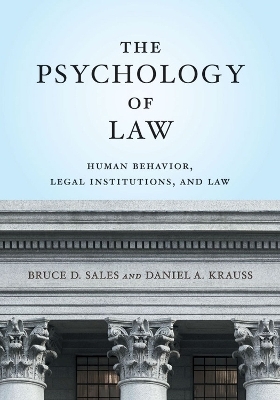
The Psychology of Law
American Psychological Association (Verlag)
978-1-4338-1936-0 (ISBN)
- Titel z.Zt. nicht lieferbar
- Versandkostenfrei
- Auch auf Rechnung
- Artikel merken
Despite notable contributions in eyewitness identification and jury selection, most legal research done by psychologists has had a minimal impact upon law and public policy in the United States. In fact, much psycholegal research is marred by systemic flaws. In this carefully-reasoned and compelling text, Bruce D. Sales and Daniel A. Krauss explain how psychologists have failed to understand the law and the context in which it operates. Even subtle misunderstandings about the nature of courtroom testimony or the application of different legal statutes across different jurisdictions, they argue, can produce research that fails to examine real world phenomena. To combat this, the authors present a roadmap for how criminal justice and forensic researchers can use research to describe, explain, predict, and provide solutions for legal situations that can have a real impact on judges, juries, and the legal profession at large. Throughout, they demonstrate a dedication to the craft of scientific research that is sure to inspire a new and improved Psychology of Law for the twenty-first century.
Bruce D. Sales, PhD, JD, is the Virginia L. Roberts Professor of Criminal Justice at Indiana University, Bloomington. Some of his recent APA books include The Science of Attorney Advocacy (with J. Findley, 2012), Courtroom Modifications for Child Witnesses (with S. Hall, 2008), Sex Offending:Causal Theories to Inform Research, Prevention, and Treatment (with J. Stinson & J. Becker, 2008), Scientific Jury Selection (with J. Lieberman, 2007), Criminal Profiling: Developing an Effective Science and Practice (with S. Hicks, 2006; Italian translation, 2009), and Experts in Court (with D. Shuman, 2005; Korean translation, 2009). Daniel A. Krauss, JD, PhD, completed a joint degree program in psychology and law at the University of Arizona, receiving his JD and then his PhD in clinical psychology and psychology, policy, and law. He is a full professor and chair of the Department of Psychology at Claremont McKenna College. Dr. Krauss has published a large number of research articles and book chapters relating to clinical psychological evaluations for the courts, legal and psychological expertise, evidentiary admissibility standards, and juries' ability to process complex expert testimony in their decision making. He is the coauthor of the textbook Forensic and Legal Psychology. He has also coedited three books (Jury Psychology: Volume 1. Social Aspects of the Trial Process; Jury Psychology: Volume 2. Psychological Expertise in Court; and Expert Testimony for the Courts) and is the coeditor of the book series Law and Public Policy: Psychology and the Social Sciences published by APA.
Introduction
The Law That Psychological Science Should Study
Asking the Appropriate Questions About Law
Incorporating the Traditional Scientific Goals
Studying the Range of Explanatory Factors
Using Valid and Reliable Scientific Methods
Comprehensively Using Psychology to Study Law: The Example of Plea Bargaining
Overarching Concerns and Solutions
References
Index
About the Authors
| Erscheint lt. Verlag | 30.4.2015 |
|---|---|
| Reihe/Serie | Law and Public Policy: Psychology and the Social Sciences Series |
| Verlagsort | Washington DC |
| Sprache | englisch |
| Maße | 178 x 254 mm |
| Themenwelt | Geisteswissenschaften ► Psychologie ► Verhaltenstherapie |
| Recht / Steuern ► EU / Internationales Recht | |
| Recht / Steuern ► Strafrecht ► Kriminologie | |
| ISBN-10 | 1-4338-1936-8 / 1433819368 |
| ISBN-13 | 978-1-4338-1936-0 / 9781433819360 |
| Zustand | Neuware |
| Haben Sie eine Frage zum Produkt? |
aus dem Bereich


